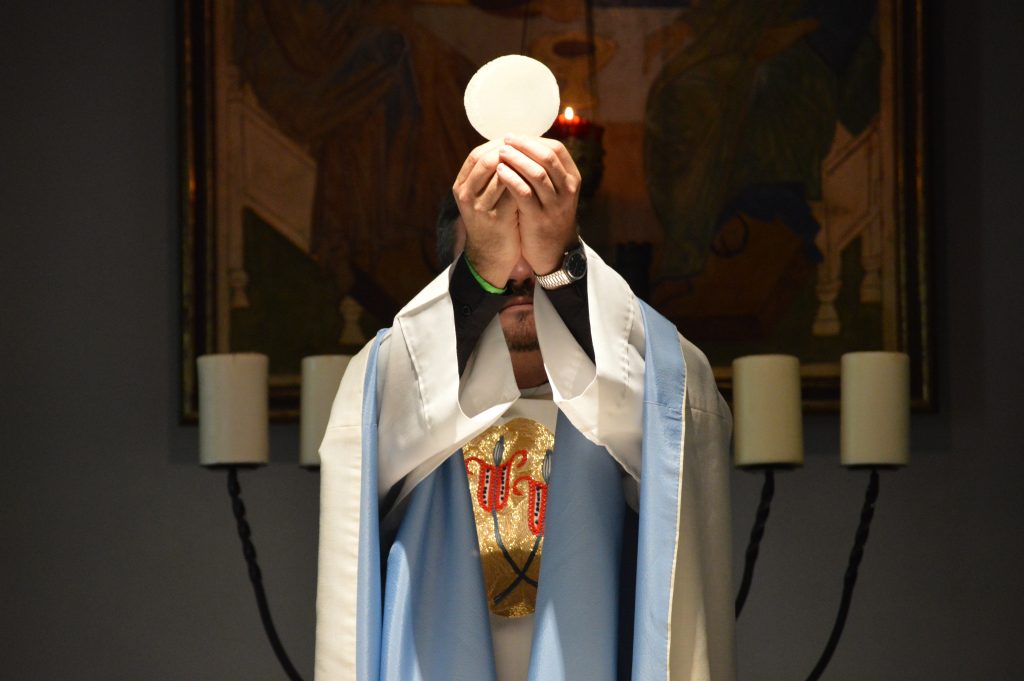As a seminarian, I was privileged one summer to take a course from the renowned liturgist, Father Godfrey Diekmann, OSB. This was back in those heady days shortly after Vatican II when it was very much in fashion to frown on prescribed ritual prayers and write your own. This was particularly true for the Eucharistic Prayer, the “Canon” of the Mass, which a number of priests began writing for themselves.
Father Diekmann, it turned out, was not a great fan of this. Asked about it in class one day, he said, “It seems today that everyone who has a tiny bit of imagination and even less theology feels obliged to write a Eucharistic Prayer.”
Because of the COVID-19 restrictions this year, I have often celebrated some form of the Eucharist virtually. At first, leading those services, my thought was, what’s the value of a Eucharistic Prayer if there is to be no Communion?
Therefore, I simply jumped from the Liturgy of the Word straight to the Lord’s Prayer. Eventually though, I deemed that something more might be offered. Thus (with Father Diekmann’s words now 40 years distant) I wrote a Eucharistic Prayer for a virtual Mass.
What is a Eucharistic Prayer? Most people would say it’s that part of the Eucharist where the priest consecrates the bread and wine, but that’s only part of it. The Eucharistic Prayer is that part of the Eucharist where we make “memorial” (“Zikkaron” in Hebrew) of the major event by which Christ saved us, in order to make that event present for us to participate in today.
We come to the Eucharist not just to receive the body and blood of Christ, but (just as importantly) to participate in an event, namely, the saving action of Christ as he undergoes his passion, death, resurrection, ascension, and pentecost. The Eucharist is the Christian Passover supper and, like the Jewish Passover supper, its purpose is to make a past event present to us.
How does this work? We don’t have a metaphysics within which to understand this. In sacred ritual, in the Eucharist, as in a Passover supper, something happens that transcends time. This doesn’t contradict the intellect, the imagination, or the laws of nature; it only takes them beyond their normal limits.
Here’s a Eucharistic Prayer for those times when there is no bread and wine to be consecrated:
“Lord, God, you break into our lives in extraordinary ways to manifest your love and save us.
“For your chosen people you miraculously parted the waters of the Red Sea and led them to safety by suspending the laws of nature. Then, in the desert, you miraculously fed them with manna and revealed to them the law within your heart.
“Since only one generation walked through the parted waters of the Red Sea and only that generation ate your manna in the desert, you, Lord God, instituted the Passover supper as a ritual through which every generation until the endtime could walk through the parted waters of the Red Sea and eat your bread in the desert. The Passover supper calls these saving events to mind in a way that, in your timelessness, makes them real again for us today.
“This is true, too, for the saving actions of your Son, Jesus Christ. His passion was a new bondage; his trust in death a new faith; your raising of him in the resurrection and his ascension a new Exodus; and his sending of the Spirit at Pentecost a new entry into the Promised Land.
“Therefore, Lord God, on the night before he died, your son left us the Eucharist as a Passover supper through which you make these saving events present again.
“We ask you, therefore, to send your Spirit upon all of us gathered here to make memorial of your Son’s saving acts. Grant that through this ritual remembrance each of us, and all of us as one community, may be united with Christ in his passion, death, resurrection, ascension, and in his sending of the Spirit. You who are beyond time, grant us today the grace of being one with Christ in his sacrifice, one with him in his dying and rising.
“As we celebrate this memorial, help us know that we are one with your Son, Our Lord, Jesus, united with him as he is undergoing his passion, death, resurrection, ascension, and in his sending of the Spirit.
“Lord, God, help us to know that the food of this Eucharist is the new manna by which you feed your people with heavenly food.
“Lord, as we make this memorial, above all we ask you to help us break down everything that separates us from one another, all division in our world, so that you may be able to feed us all at one table, as one family, as one God of us all.
“We pray all of this through, with, and in your Son, Christ, Our Lord. Amen.”
In the Eucharist, we don’t just eat the bread of life, we also die and rise with Christ.

